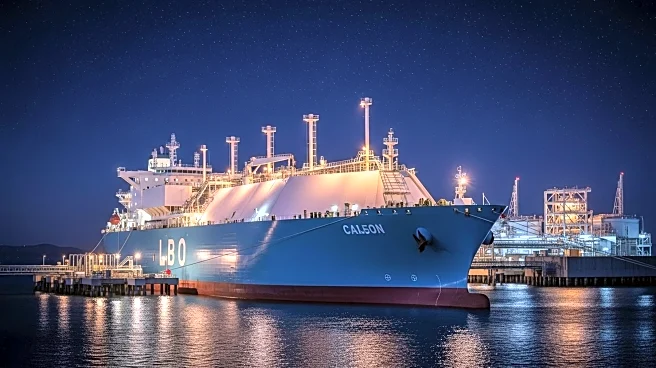What's Happening?
Shell's LNG Canada project is poised to load its first liquefied natural gas (LNG) cargo from the facility's second unit, known as Train 2, as early as this week. This development marks a significant milestone in the project's ramp-up phase, which is expected to continue over the next month. The British Columbia facility, Canada's first LNG project, is strategically positioned to meet rising Asian demand for gas and bolster Canada's role in the global LNG market. Shell, the majority stakeholder, along with partners Petroliam Nasional Bhd., PetroChina Co., Mitsubishi Corp., and Korea Gas Corp., anticipates the two-train facility will reach full capacity by 2026.
Why It's Important?
The ramp-up of Shell's LNG Canada project is crucial for meeting the increasing global demand for natural gas, particularly in Asia. As the first LNG project in Canada, it represents a significant step in diversifying the country's energy exports and strengthening its position in the international LNG market. The successful operation of Train 2 will enhance Canada's energy infrastructure and contribute to economic growth by creating jobs and fostering international trade partnerships. Stakeholders in the energy sector, including investors and local communities, stand to benefit from the project's expansion and the economic opportunities it presents.
What's Next?
As Train 2 begins operations, Shell and its partners will focus on optimizing production and ensuring the facility reaches full capacity by 2026. The project's progress will likely attract attention from global energy markets and may influence future investments in Canadian LNG infrastructure. Stakeholders, including government officials and industry leaders, will monitor the project's impact on local economies and international trade dynamics. Additionally, the successful ramp-up may prompt discussions on expanding LNG export capabilities and exploring new markets.
Beyond the Headlines
The development of LNG Canada highlights the growing importance of LNG as a cleaner alternative to coal and oil, aligning with global efforts to reduce carbon emissions. The project's success could encourage further investment in sustainable energy solutions and drive innovation in the LNG sector. Moreover, it underscores the strategic role of Canada in the global energy landscape, potentially influencing geopolitical relations and trade policies.










